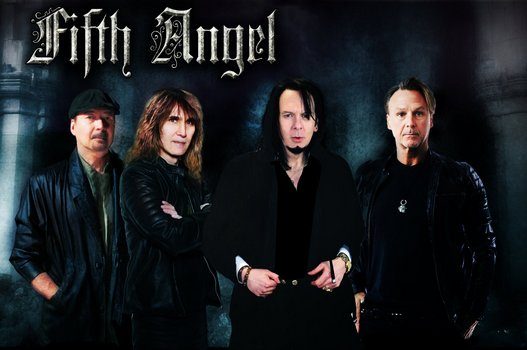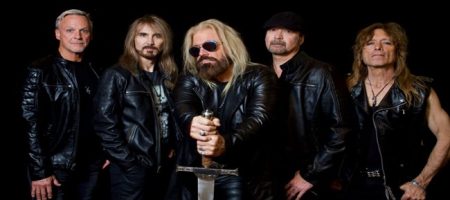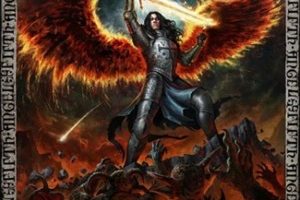Fifth Angel – A Welcome Secret
Tuesday, 16th October 2018
The Northwestern metal scene back in the 1980’s exploded thanks to the major label development of Queensrÿche. If you look through the years, numerous bands made their mark from Metal Church to Sanctuary, Heir Apparent to the following band interviewed Fifth Angel. Although only releasing two albums in their self-titled debut and Time Will Tell follow-up, their style of melodic metal with power and traditional influences penetrated the scene as they moved up the ranks from Shrapnel/Roadrunner to Epic Records. Falling off the face of the map when ‘grunge’ overtook the mainstream scene, a series of successful reunion shows in Germany started the seed for finally recording a third studio album, The Third Secret.
Returning guitarist Kendall Bechtel takes on the vocal helm – and the record is chock full of that exquisite musicianship and attention to melodic details that made Fifth Angel a cult classic favorite. From the shredding moments against power double bass for opener “Stars Are Falling” to the emotional first single “Can You Hear Me”, it’s hard to believe 29 years have passed since last hearing new material from the band. Reaching out to drummer Ken Mary, it’s another bucket list interview for this scribe as you’ll hear how this reunion came about, what the future looks like, and honest views on the changing music industry landscape from a veteran of the scene.
Dead Rhetoric: Fifth Angel is back with your third album The Third Secret – the first since 1989 for Time Will Tell with the band. What circumstances took place to finally arrive back in the studio, and did any apprehension or worry set in about tarnishing the reputation and legacy of those first two albums?
Ken Mary: I guess I’ll answer the second part of the question first. Yes, there was definitely a hesitancy, and if you want to get back to one of the main reasons why we hadn’t put out a record in the past, that was really more of (the reason) than anything. It was almost a subconscious thing, I don’t think any of us were consciously thinking we were going to have to be in the same ballpark as those other two records. We knew that the bar was set high for those two albums, and those albums are considered metal classics in Europe especially. We were cognizant that if we were going to put something out, it’s really going to have to be something that we feel super strongly about ourselves.
When you say what were the circumstances that brought this about, I think there were a couple of things. One of the interesting things about this band in particular is, and I’ve said this in a couple of interviews, every band says, ‘well, we are here because of the fans.’ They say that… in the case of Fifth Angel, it literally is 100% fact. This really started with a couple of shows the band played in Germany – most notably the Keep it True festival show in 2017. It was just something that the fan response was truly overwhelming. Sold out 4,000 people, we had an opportunity to play that festival and the crowd sang along to every song, they just loved the music. It made us think about the fact that we really did impact people. To some degree the band didn’t really understand back then how much we impacted people, especially in Europe. We knew that we sold some records and achieved a certain level of success, but I don’t believe any of us believed that thirty years later that people would still think these are amazing records.
I wasn’t at the 2010 reunion show, but the one in 2017 is the one that we decided that maybe we should try to put together some new material. The band had tried to do that over the years, we had some interesting circumstances in that regard. We never really found a singer that sounded like Ted Pilot- he has a unique vocal style, and we never could really find someone to completely fill his shoes. When we were doing demos for this album, Kendall who is the guitar player in the band, we knew he had a good voice. He never really wanted to be the singer to begin with, but I heard him singing on these demos and he sounded so amazing. I told him I thought he was going to have to sing on this record, because no one was going to sing those songs any better. Once we kind of gave into that, everything really progressed very rapidly and the songwriting was very natural.
We worked with some great singers, but they didn’t have that Fifth Angel sound. We didn’t want to put out the record and have people think it wasn’t related to the first two albums. For the first time we did demos, it sounded like Fifth Angel, it was powerful, it was exciting, and something we all wanted to put out. Hopefully the fans will agree.
Dead Rhetoric: When it came to the songwriting, is this all fresh material developed over the past few years or have some riffs and ideas snuck in from the archives? Were there any surprises or obstacles the band had to overcome through the recording process?
Mary: The material is all new. None of this is from the archives. We have some ideas for the next album where we might look at some of the archives- a couple of decent songs that we were considering. We would probably alter them. Here’s the problem when you start getting into a band’s archives. If it didn’t make it on one of those records to begin with, chances are it may not be the strongest material. I think it would be more like what you are saying where you pick a riff and rewrite everything else.
As far as obstacles. Honestly the only obstacle that we had to overcome was the initial obstacle regarding vocalists. They were good singers, quality musicians would be the best way to describe it. For whatever reason, it didn’t sound like Fifth Angel. That was the main obstacle to overcome, we have a vocalist now that sounds like Fifth Angel. And that was one of the comments from Nuclear Blast when they signed the band as well – we worked with Jaap Wagemaker who is a phenomenal guy at the label. He let us know it does sound like Fifth Angel, and once we got to that place, the rest of the process fell into place very naturally and smoothly. It was not a fight to make this record at all.
Dead Rhetoric: Did you know that Kendall had the ability within him to carry the vocals for Fifth Angel – as he seems to excel in that department as much as his guitar work with Ed Archer for this record?
Mary: As a matter of fact, we are dealing with the challenge of Kendall singing and playing guitar in the band right now. One of our ideas is thinking about getting another vocalist- sort of like what happened with the Helloween United tour where they had three vocalists, headlining Wacken. What we are considering is having Kendall singing on the new material, and finding a vocalist/guitar player that sounds more in the Ted Pilot vein and just come in to do that material. Kendall is an amazing guitarist and we don’t want to lose that aspect of what he brings to the band. We will be playing some upcoming shows, and we’ll see how that falls into place.
Dead Rhetoric: What made Nuclear Blast the right label fit for Fifth Angel this time? Do you believe their staff on a global scale have the right care, vision, and ability to aid the cause, especially considering the shifting tides in the music industry?
Mary: Absolutely. I think Nuclear Blast is the ideal label for Fifth Angel to be working with. They are super supportive of us, they’ve allowed us to artistically do pretty much whatever we want to do, and we can’t say enough about the staff. We’ve worked with a lot of amazing labels over our career, including Epic, Roadrunner, Shrapnel, and Nuclear Blast is amazing to work with. We can’t imagine a better home for the band.
Dead Rhetoric: When looking back at those mid to late 80’s albums for Fifth Angel as a part of Shrapnel and then Epic, what do you think were the upsides and downfalls for the band achieving a certain level of respect in the scene, but not achieving that ultimate breakthrough?
Mary: I think the timing was bad. If the band had come out maybe a few years earlier, I think the results may have been much different than what they actually ended up being. If you look back through that time in history, once the grunge scene hit in the early 90’s it ended Fifth Angel and a ton of metal bands had a real tough time. It’s really unfortunate, because if you look at music history there have only been two times where this has happened.
Once during the grunge era, where if you were a metal person you hated grunge, and if you were a grunge person you hated metal. It was really weird, that they both couldn’t co-exist together. And if you look back further into the late 70’s, early 80’s – people were burning disco records, and that’s the type of backlash that happened against metal. Epic dropped the band because they didn’t see the future going in our style of music. The grunge fans in Seattle hated the band, it was a very tough time. If we were better established at the point that (grunge) hit, we would have been fine. Queensrÿche did well through that era, Megadeth, Metallica- all the big metal artists survived, and we didn’t quite get to that level.
Dead Rhetoric: And people forget, there was a pretty potent metal scene in the Northwest part of the country back then, correct?
Mary: That’s what Fifth Angel came out of. Before the grunge scene, there was the metal scene in Seattle. It consisted of bands like Queensrÿche, Metal Church, Fifth Angel, and Sanctuary. A lot of that Seattle metal, it really started in the early 80’s – and by the time the 90’s hit it was a different style. Not to belabor the issue, but I thought not liking metal during the grunge era was kind of a weird attitude to have. Grunge didn’t stick around that long either- what bands have truly survived from that whole era? It was around for 3-4 years, and you have a few bands that tour, but it didn’t last very long.
Dead Rhetoric: How are you dividing your time between Fifth Angel and Flotsam and Jetsam – will one be more of a priority over the other?
Mary: There are lots of guys that are in multiple bands nowadays for the same reason you mentioned. It’s a very tough music industry now compared to what it used to be. A lot of guys have to be in two or three different bands just to make a living at it. I don’t think it’s unusual nowadays, and neither band is going to tour full-time, hopefully there will not be any conflicts.
Dead Rhetoric: Out of the numerous bands, artists, records, and tours that you’ve done in your lengthy career- what have been some of the standout moments?
Mary: There’s been so many of them, but there are a few that stand out. My first Alice Cooper tour, I was very young. The biggest place I had played prior to Alice was probably a 3,000-seat theater. Our fifth show together was a sold-out Joe Louis Arena in Detroit, 22,000 people and broadcast live on MTV in front of about twenty million more. That was obviously one of those standout points, something pretty massive and pretty impactful in your life. I have a lot of fond memories of House of Lords, and a lot of fond memories with Fifth Angel too. There are a lot of different artists I’ve worked with and a lot of different projects I’ve been involved in. If I had to pick one moment that stuck, Alice is it.
Dead Rhetoric: Another band that impressed me that you played in during my teen years was Chastain. What did you think of those records?
Mary: David is an awesome guy, and I message him back and forth on Facebook. We are in contact with each other. For its time, it was pretty amazing stuff. I even talked to David to see if we could go back and remix some of those records. The only thing that bothered me a little bit on those records was the mixdown. He doesn’t have the master tapes anymore. We played some really cool stuff, especially for the era that it was. We made some music that stood the test of time. If you look at the projects that I’ve been involved in, quite a few of them have stood the test of time.
Dead Rhetoric: Do you believe the landscape for your brand of melodic-oriented traditional/power metal is stronger now than it was decades previously?
Mary: I think so. What really tipped that off, you were talking about Flotsam – and we just toured the United States with Hammerfall. We would hear them every single night, and they have wonderful songs – you would walk around singing them. Listening to what they’ve done, they sound like they were influenced perhaps by Fifth Angel. I didn’t talk to them about that, but I know they have a cover of a Chastain song “Angel of Mercy”. They were influenced by that whole era, and next time I’ll have to find out if they were influenced by Fifth Angel. They are very successful in Europe- so I’d have to say if the climate is better, it’s better than it has been for the band in quite some time.
Dead Rhetoric: How have you adapted to the changing promotion/publicity model for the music business with instant technology and social media taking things to another level compared to the old school model?
Mary: It’s definitely a different era, like you say. In the old days, if a fan wanted to get a hold of you they’d have to write you a letter, or get through to you through your management. Now people can get to you through Facebook. It’s a more interactive musical society than it ever has been, and I think that’s something I like. It’s really cool that you can get instant feedback from people. On the flipside, some of the feedback that people have these days is pretty crazy (laughs). I think the internet gives people the idea that they can just say whatever they want, and I’ve seen some harsh things about other bands and people that say horrible things about artists that are just trying to make music that makes people happy. You take the good with the bad, and overall I think it’s a good change.
Dead Rhetoric: How do you feel about your drumming at this point in your life – is it easier or harder as you get older?
Mary: It’s interesting. I’m playing at a level that the younger Ken Mary would not be at. I think I’m playing things nowadays that I would not have been able to play. On a technical level, the playing has gotten stronger. On the sheer power bashing, it depends on the style. With Flotsam, it’s a more technical type of drumming, the songs are so fast that you don’t get a chance to wind up on the drums, or pull back and dig into them. With Fifth Angel, it’s obviously much slower tempos and gives you the ability to really put a lot of power into it. I think overall, I’m a better player. Is it more difficult? I think it takes a little more toll on your body than when you were younger. When I was young, I could do anything and not think about it. You could go out, drink, and now – we did 40 shows in 43 days, and people said how could I do that? I didn’t eat any sugar, I didn’t drink any alcohol, I made sure I slept. I couldn’t have done that when I was twenty.
As you get older, you have to pay more attention to the machinery and the mechanics of doing what you are doing. You have to make adjustments, otherwise you are going to look stupid up there (laughs). If it gets to the point where you can’t pull it off on stage, don’t stay up on stage. I’ve seen some artists like that, don’t tarnish your image. As an artist, you don’t want to ever be able to not deliver on a performance level. If you get to that point, maybe it’s a good time to stop, right?
Dead Rhetoric: Do people ever come up to you for advice considering all your experience in the business – and if so, what do you talk to them about?
Mary: I do get young musicians and artists – I’m a producer as well, and have had quite a bit of experience dealing with younger artists. One of the big pieces of advice that I give them, and I wish somebody would have told me, because being young you always want to succeed. That’s your main goal in life, you want to be successful. There is something when you are making art that is more important than that. Make art that speaks to you personally. In other words, if you are going to make an album, I’ve had some young artists I’ve worked with that will tell me they love this song, but don’t like another one and will still put that one they don’t like on the record. I ask them why would you do that- music you don’t believe in, so why should somebody else believe in it? Do what you love, do the music that means something to you and moves you as opposed to following the trends and what’s selling. If it moves you emotionally, then hopefully there will be other people that will agree with you.
Dead Rhetoric: What’s next for Fifth Angel following the release of the record – are you hopeful for some touring or will you be selective in live appearances?
Mary: I think we are going to be a little selective with live appearances. We have to be from a financial standpoint. I suspect our touring audience is going to be more European based – and the moment you step off the plane over there you are $5,000-$8,000 in the hole right off. We are going to have to be careful. That being said, we’d love to get out there and meet the fans face to face. Show the fans that we do appreciate their support. With this band, literally none of this would be happening without the fan support that we’ve had, keeping this music alive for almost the last thirty years now.
We actually asked every former member to be a part of this- we asked Ted to be a part of this, James (Byrd) to play on the record. He was in the middle of moving his household, otherwise James would have played on two or three songs contributing some leads. We are very open-ended, we’d like to include everybody. If you look at what Helloween did, they had that tour and brought back singers from different eras. I think it was a cool thing for the fans. In Ted’s instance, he hadn’t sung in a number of years and he told John that he didn’t feel he was at the level where he could help the band, the level that would be required. But who knows, maybe he will sing on a couple of songs for the next record. I think that would be great.

























